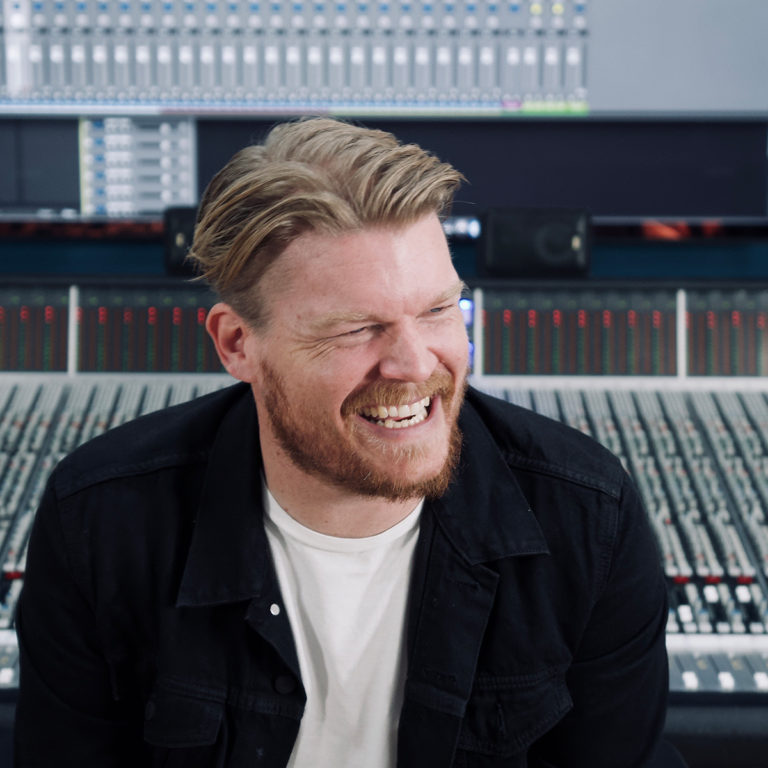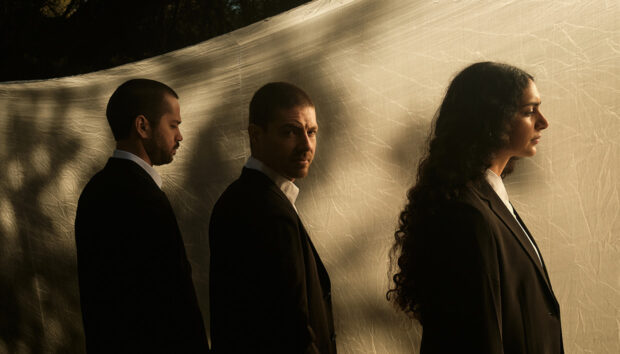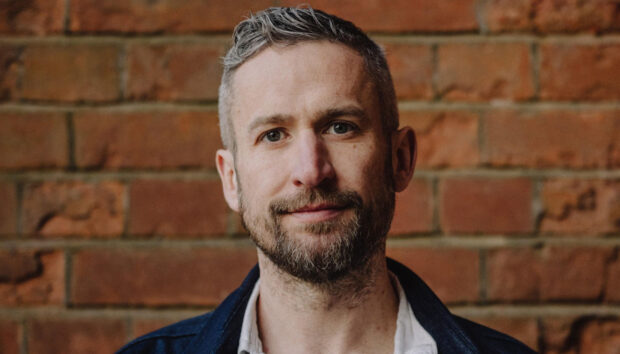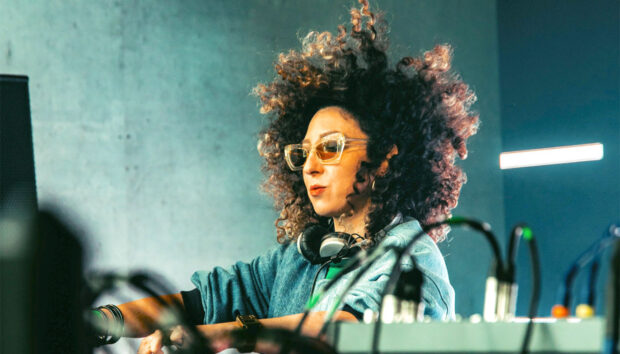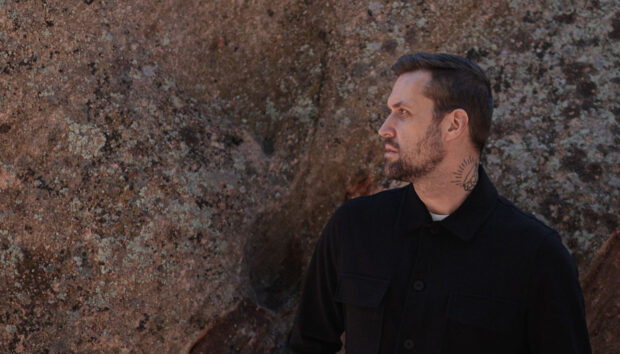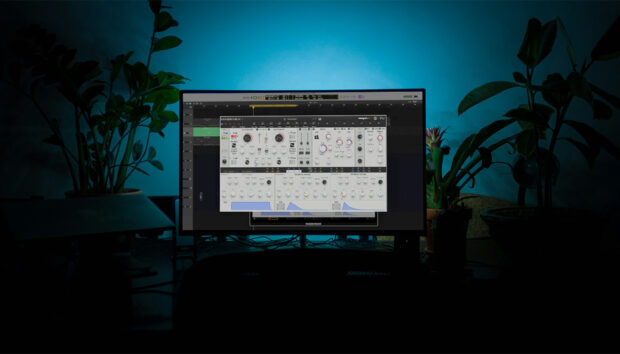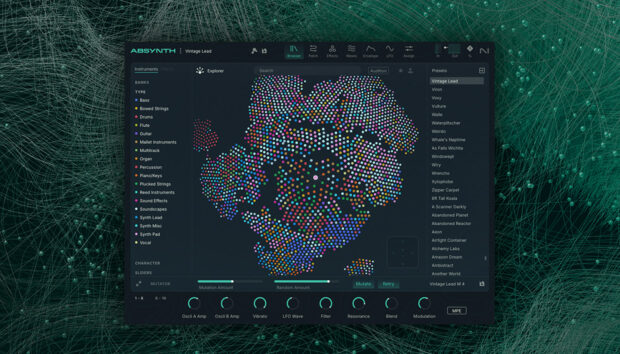Underoath has always done things differently, from defining what Christian screamo could sound like to shattering all notions of that on genre-bending albums like Define the Great Line and Erase Me, which blur the line between rock and electronics with big distortion, saturation and jaw-dropping dynamics. Since the turn of the millennium, the Florida six-piece has heavily pioneered the use of synths and production trickery in metal, in large part due to the influence of Chris Dudley, who joined the band in 2000.
Chris Dudley is Underoath’s keyboardist, sometime producer and the guy with the Herculean task of organizing many layers of studio stems and effects into Mainstage for the group’s formidable live shows. Dudley – who also composes for film and TV – plays a large part in the group’s dramatic, visceral sound, embracing distorted MASSIVE saw waves as equally as SUPER 8’s warm analog-inspired tones and custom KONTAKT synths (which he designs from field recordings, backing vocals and all points beyond). When I reach him at home in Brooksville, Florida, about an hour’s drive north from Tampa, he’s enjoying a rare moment of relaxation after finishing the recording of Underoath’s ninth studio album and anticipating the release of God’s Waiting Room, an indie film he recently scored.
While awaiting all this new music, we asked Chris to tell us more about his creative process, how he uses KONTAKT and the KOMPLETE KONTROL S61 keyboard, and exactly how he made some of Underoath’s most dramatic tracks.
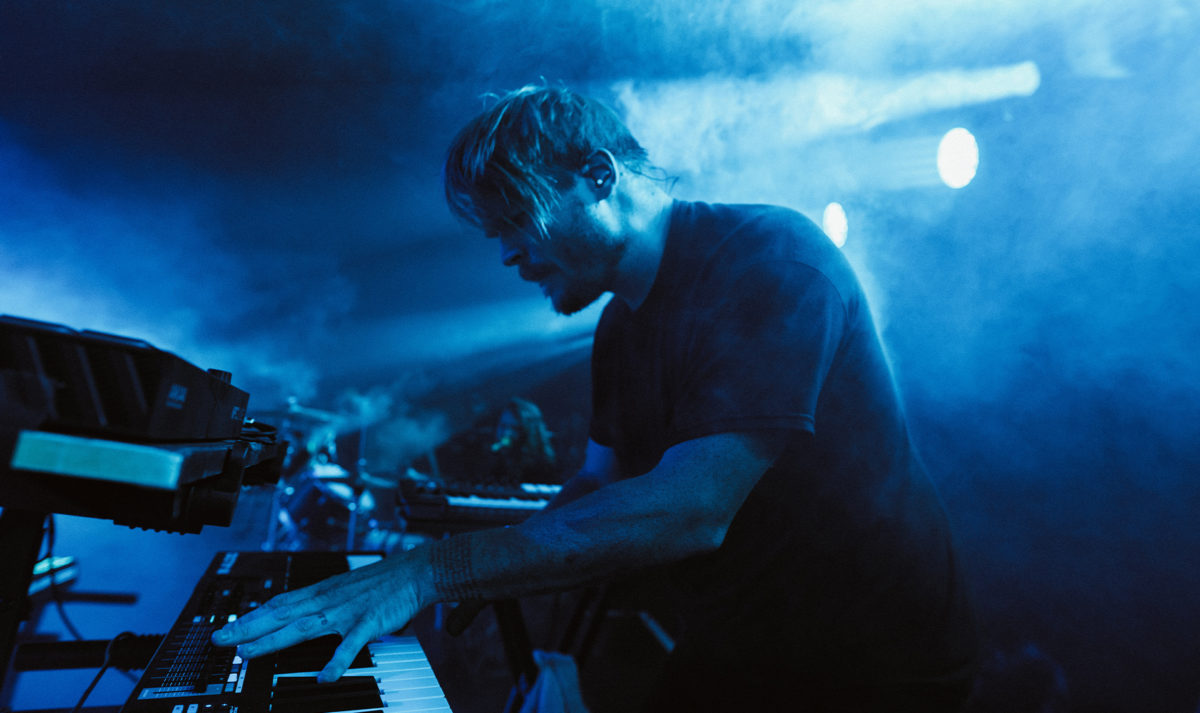
“As far as my gear is concerned, I have a handful of things that I’m always using no matter what,” Dudley explains of his studio set-up. “I know for a fact that 80% of what I’m going to be doing is going to be running in Kontakt. The producer that did our record in 2004, James Paul Wisner, was the first one that turned me on to it. It’s been one of those things through the years, along with Absynth and Massive, that are just part of my toolbox always. Kontakt cuts down on some of that ‘paralysis of analysis’ stuff because it helps me narrow it all down. It’s easy to mess around until something crazy happens. Kontakt’s Quick Load menu has been a game-changer. I’m able to have my library on the left, but then my Quick Load menu is probably three times that size. Every little instrument I’ve gotten from every corner of the internet and every instrument that I’ve made, I’ve put into Quick Load, and then I can just access anything I want. I nerd out so hard on that.”
“In terms of how I use Kontakt, I would say probably 30% of that is custom stuff that I’ve made,” he shares. “I just got done working on [an indie film called God’s Waiting Room] and I built a handful of instruments specifically for the score. The film takes place in Florida, so I recorded a bunch of stuff that we felt represented Florida, like cicadas and air conditioning units. Then I brought those into Kontakt, layered them with other things and made instruments out of them. That’s really some of my favorite stuff to do. On this Underoath record we just got done with, I made a whole patch out of our drummer’s vocal take. Earlier on in 2020, I scored a horror film called Bad Candy, which is coming out in September 2021; I sampled my daughter’s singing and did some processing in Kontakt and made it sound all creepy. It was a ton of fun!”
Recently, there’s been quite a bit of interplay in between Underoath’s new music and the scoring work Dudley’s been doing. “On this recent record, there were quite a few points where I was like ‘I want something that sounds evil or gross or cinematic and dark,’” he recalls. “When I had my first call with the director of Bad Candy, he said, ‘I want this movie and this score to feel like what Halloween felt like when you were 12 years old’… which is awesome! I ended up bringing a handful of the instruments I had created for that film into this new Underoath record and tweaked them and changed them to work with our sound.”
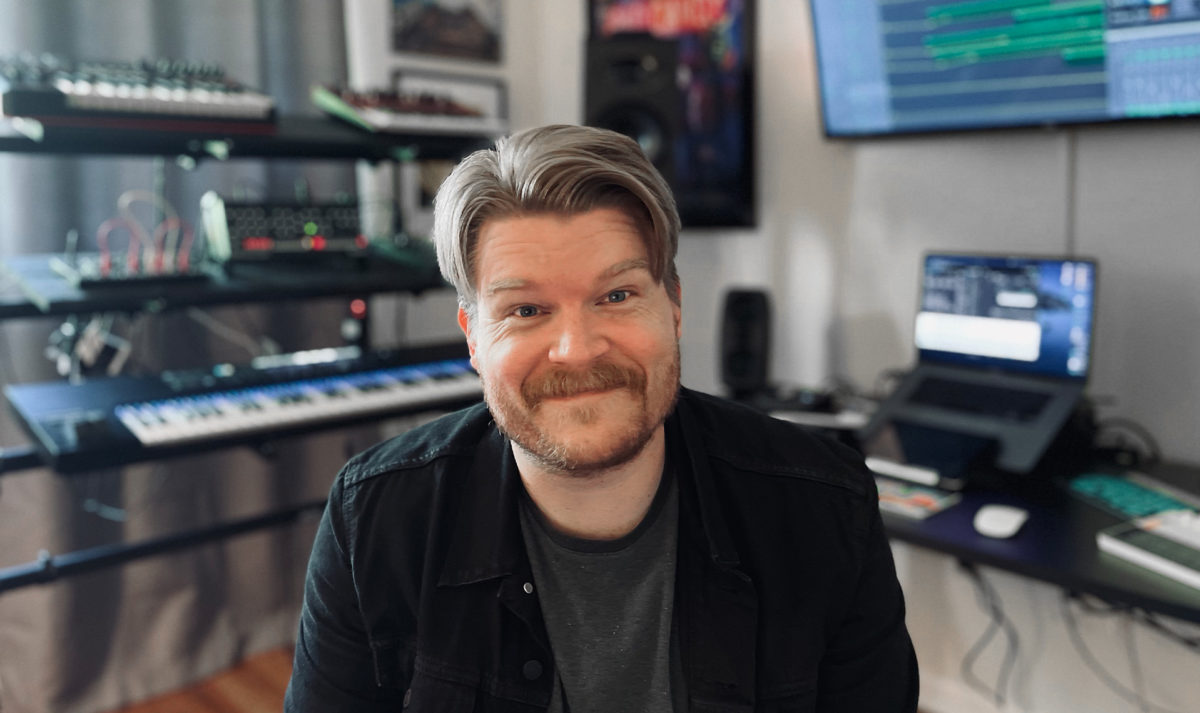
Dudley relies heavily on Kontakt’s sampler while creating his own instruments. “Once I get a sample, I like to map it the way that I want. A lot of times I’ll have to set up loops in a specific way – for instance, when I hold this key down, where do I want the loop to happen so it sounds like it’s just one long note. The big thing that I nerd out on Kontakt with is being able to mess with the pitch, timing, attack, release and all of that to get the loop exactly the way I want it, and then go from there. The Time Machine Pro function allows you all these crazy tempo-switching capabilities – you drag the loop into Kontakt, click Time Machine Pro and it automatically syncs your loop with the tempo of your session and keeps it in the same tempo anywhere on the keyboard. So you can play three octaves down and it will sound a lot more wide and deep and dark but the tempo is the same. Or you can timestretch stuff and make it sound all wild. So much of what I do in Kontakt, I don’t think about it too much more – it’s kind of like magic.”
“Sometimes I’ll go nuts with effects, sometimes I won’t really need to,” he explains, as I pry deeper into how Underoath achieves their wild soundscapes. “But I tend to always want to dirty something up, whether it’s a slight grit on the top end or completely destroying it. I like experimenting with how gross I can get something to sound and then bringing it back to what it should be. I tend to lean towards Decapitator and I love running stuff through Guitar Rig. If something needs to be softer or wider, I love experimenting with reverb. Sometimes I just create an effects chain that I think sounds cool. I’ll usually start with something very simple, like a piano note, and create an effects chain that makes that piano sound really cool. Then I’ll save the effects chain and experiment with throwing sounds in there – a guitar, drums, a clean synth, a Theremin. That has brought me a lot of really cool stuff and gnarly sounds that I would not have thought of otherwise.”
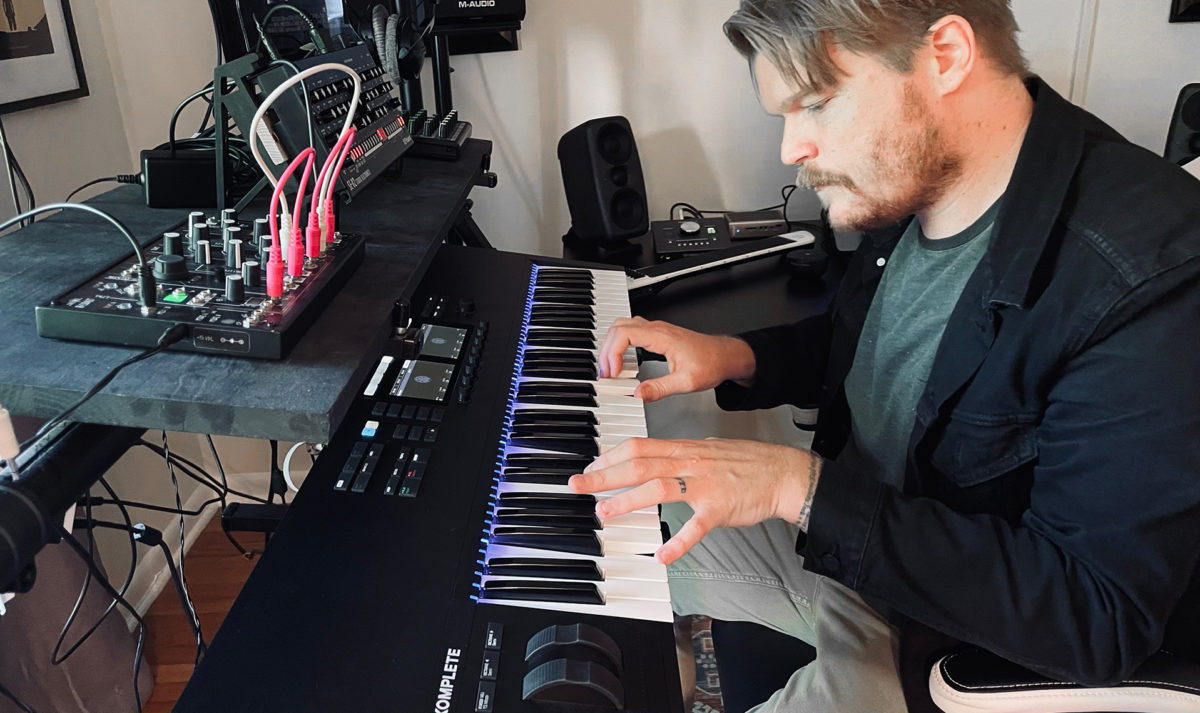
There’s been another change to Dudley’s workflow during lockdown: he added the Komplete Kontrol S61 keyboard to his set-up right right before working on God’s Waiting Room. “As soon as I got it, I was like ‘I’m going to be using this for everything,’” he enthuses. “The fact that you can do built-in auditions in the keyboard’s browser has been huge for being able to narrow down what I’m looking for. Now I’m literally tweaking a knob and hearing 10 auditions for drums or synth sounds in the time it would have taken me to load up a second kit. I also like the smart-scale capability of being able to say ‘Okay, now I want it in this key.’ It definitely helps me come up with ideas I hadn’t thought of. Now that I’m used to it, I think I want the S61 to be the new live keyboard for Underoath. When we play live, I want my stuff to be the exact patches and effects that I used in the studio. I’m interested to see the functionality of the S61 with Mainstage, [the program we use to run our live rig] – I have a feeling there’s going to be some cool stuff that I have not been able to do before.”
Underoath’s ninth studio album has been long-awaited, but the global pandemic made things even more tweaked. “COVID really threw a wrench into our whole plan for this record,” Dudley explains. “We started writing it in mid-2018. Normally when we go into the studio, we’re usually about 70% done with the writing. Initially, our plan was that we would record in early 2020, put out a song, go on tour with Slipknot and then put the record out at the end of that summer. But when COVID hit, we were like, ‘Why don’t we sit on these songs and revisit them toward the end of the year to see how we feel?’ And when we revisited this stuff, there was so much that we wanted to change.”
“The big thing that COVID taught us was that we don’t need a producer to do a record,” he reflects. “This is the first record we’ve ever done that has not had a producer involved at all – we tracked and recorded everything ourselves. We literally just Frankensteined our studios together in Florida. It also pushed us to figure out how we can write the best way possible without us all being in a room. We’re realizing new workflows that are better in a lot of ways because now we’re able to get so many ideas out individually without having to wait for anyone to record or anyone interrupting; there’s so many good ideas floating around and they’re almost fully-fleshed out. So I think we’re on to something really special.”
While awaiting Underoath’s next album, we asked Chris Dudley to go back in time and tell us how he made some of his favorite songs.
Underoath "Rapture" (off Erase Me, 2018)
“This song came in toward the end of the recording process and honestly it happened really quickly. Our singer had written it already so it came in fairly fully formed. We knew we wanted the intro to be all electronic drums. I was in the studio auditioning sounds in Battery and used a kit that I ended up tuning down and distorting; I’m not sure which one because I’ve since sampled it to be able to play live. I have a Massive patch that worked really good on choruses for the previous record, so I just brought that back and put it on the chorus. There’s some low piano going on in the bridge that’s a The Maverick piano from Komplete, all reverbed out. All of my piano stuff has basically switched over to Native Instruments Noire now – I don’t use any other piano plug-in anymore since I’ve gotten that.”
Underoath "On My Teeth" (off Erase Me, 2018)
“I wrote the intro to this song at an odd time in the band’s history where I was not sure if we were ever going to tour again. While I was writing it, I was thinking, ‘If I ever am on a stage again, I want to start a set with something that’s super high-energy, something that just feels like it’s getting your heart pumping.’ When we got back together to do another Underoath record, I was like ‘Hey, I’ve got this idea’ and everybody was like, ‘Yes, we’re going to start from here and make a song out of it.’ It’s a driving, percussive synth thing and a lot of people thought I’d used Massive or analog gear but it was based on a Retro Machines MK2 thing within Kontakt. I started from a preset and pitched it a little bit, but I didn’t do a whole lot. There’s this drum roll that was also based on a preset in Absynth called ‘The Hook’ that I changed very little, and I’ve got like three layers of Massive that are pitching up and down. The bridge of the song starts out with drum clicks and then there’s a synth lead throughout which is the Histamine patch in Massive that I ran through Soundtoys’ Decapitator plug-in; just dirtied it up some and widened it out a little bit. The verses are basically this wild drum thing and then just these hits of synth and guitar. With those synth hits… we knew that we just wanted them to feel gross. We actually layered this custom Massive patch I made with a Virus TI [synth] underneath it to create that. I love that verse in the chorus, in particular… If you solo it out and you hear what’s actually going on there, it just sounds crazy.”
Underoath "Casting Such a Thin Shadow" (off Define The Great Line, 2006)
“This one was recorded at the end of 2005 or the beginning of 2006. Back then, I believe I was on Kontakt 2. The intro for this is another Rhodes thing – a built-in electric piano patch that, again, we put through an external guitar pedal to distort a little bit. We were recording this album in Massachusetts but I flew to Atlanta to do some more production down there with another producer. While I was gone, the other guys decided they wanted to thicken up the sound so they recorded an actual stand-up organ, like a small pipe organ, and put that underneath. Then there’s a kind of drone that goes throughout, which was a built-in Kontakt 2 synth into a reverb plug-in. Also at the end of this song, there’s a big manly-sounding guitar part. For that, we ended up taking a sample from a Kontakt piano, pitching it down a couple octaves to make it sound huge, and layering it in to beef up the guitars, which I thought was a fun experiment.”
Underoath "Desolate Earth: The End Is Here” (off Lost In The Sound of Separation, 2008)
“We recorded this song in 2007. I was using Kontakt 3 back then and the intro to the song was a built-in Rhodes patch that we ran through an external guitar pedal, to give it a very slight amount of grit. That Rhodes goes basically throughout the whole song. There’s a lot of different electronics in that song but we wanted it to feel very organic, very cinematic; we had a real cello player come in for the first time. Obviously I don’t have Kontakt 3 anymore so when we play that song live I’ve started using a vintage-sounding patch from the Kontakt factory library with a little Decapitator thrown on it just to grease it up a little bit and some reverb as well. This is the first thing I wrote that made me realize I wanted to do film stuff so it holds a special place for me. There’s a lot of end-of-the-world, post-apocalyptic stuff on that record; the idea of the album was looking at humans as being what is going to end the planet. ‘Desolate Earth’ is the last song on the album; as I was writing it, our singer Spencer walked by and said the song felt ‘like the end had happened and almost everybody was gone.’ I wrote the song while I was watching a lot of the movie 28 Weeks Later; John Murphy did the score and, in hindsight, I was very heavily influenced by that.”
Chris Dudley “Exhale” (from the score to God’s Waiting Room, 2021)
“God’s Waiting Room is a movie I just scored. It’s a drama set in Florida, and it feels very much like sweaty Florida, which I love. It follows a young girl who is pretty fed up with what she views as her slow, boring life; at the same time, it follows he story of a felon who’s just been released from prison in the same town. In the third act, their stories are on a collision course. When a movie is really good, it makes what you’re doing musically pop even more, and I’m super pumped on this one. This piece of music from the film starts with a low, warm synth from a custom patch I made in Kontakt. Throughout, there’s this low Arp that comes in, which is something I made in Reaktor. One of the lead parts is actually from the NI synth Super 8, which I try to tell everybody about because I think it’s a sleeper and not enough people are talking about it. Super 8 came out right when I was in the middle of scoring this and once I started playing with it, I was like, ‘Oh damn, this needs to be in more of the film’ so I made some patches in there. In general, the starting points of the Super 8 presets are so up my alley – some of them are so warm and they’ve got such a good analog feel. There’s enough ability to mess with the sounds and make something your own but even if you just wanted to use the presets, you could easily tell people you were working on some ridiculous analog piece and they’d believe it.”
Follow Chris Dudley on Twitter and Instagram, and follow Underoath here.








